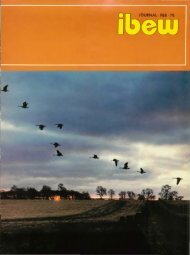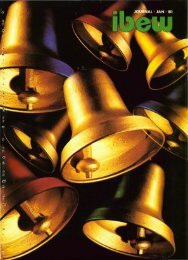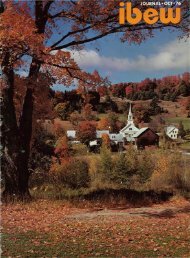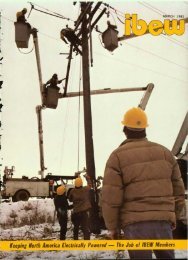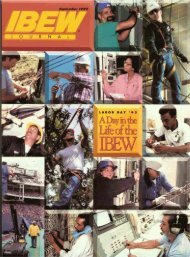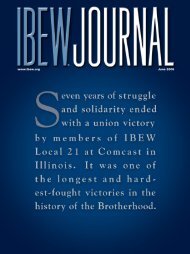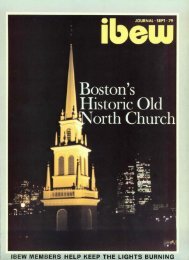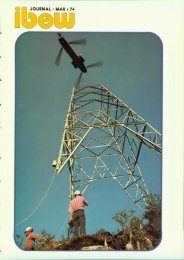t - International Brotherhood Of Electrical Workers
t - International Brotherhood Of Electrical Workers
t - International Brotherhood Of Electrical Workers
You also want an ePaper? Increase the reach of your titles
YUMPU automatically turns print PDFs into web optimized ePapers that Google loves.
64<br />
ARNOLD Iudn Beda<br />
TO ROAST PIG<br />
The Journal of ELECTRICAL WORKERS and Operators<br />
Whatever may have been the doubts<br />
on coengresions intent in the case of the<br />
Sherman Act, with all the agitation in<br />
the intervel.. .ig yauIs, there should have<br />
been litthle doubt of the purpose of the<br />
(layt.on Act menlhdnents. They inlme<br />
as the inswer of labor's incessant t deiland<br />
for clarifiecion of the Sherm.an. Act<br />
in reltion to ,labor unions.<br />
By HENRY E'STEIN, Solicitor General, New York<br />
lABO(R'S "MAGNA CHARTA"<br />
The ClaytoLIn Act was passed in October,<br />
ILI4. Sections 6 and 20 are the<br />
Equliiiy .. der the In. ivj, the Co*at<br />
i it oi g.a..antees lal be violated in<br />
thr.ee ay;t:<br />
First, bit legislation which is onjnlst<br />
in, its icceptint;<br />
Seco'nd. iy jdnitial constrIction<br />
uhich mlrkes what 'ould thewise hj be<br />
a jlst law,. ntnjlf inl its onp.leation;<br />
Third, by tnjlst ditlseinitatilt in<br />
lhe adninisti atiol of law by 9omrernvientfs<br />
efl),ree"net ageinies.<br />
T'here is no nlre Ili.il.l.ii thireat II<br />
labor's right to eqiality ,ndei l he law<br />
thalo the recently e ried ipplationl of<br />
the Sihermllan* Aet by the [. S. DepatnLentl<br />
of Jslice whieh .seeks to soeti l is tiolatinns<br />
under th, third clssijication by<br />
inv okaiq jdicial pi. ecedets . which were<br />
h.em.s.lna 'inat filts ,tide,¢ lthe second<br />
classi.fiction.<br />
in vi.. of this threat, it was fitting<br />
that lhe (Confe~ cce ont (o,,tellpoia.y<br />
I*'bl .e..s in L hboI Latw atd Reintiors,<br />
held at In'shington, D.C., in Jan larmy<br />
tiltdee the sponsorship of the \ationla<br />
L*utL ers G,,ild, selectcld as its first topic<br />
"Allti-TsIt L rid ,irs L.bo, .". The r<br />
foll o..s a c andeitrolt of at, add,'ess o<br />
thin sbject delivered at the corffee.ne<br />
by the ion. Hfeny Ei'stein, solicito,' g,ean<br />
of the state of Ne, York. It is<br />
regretted thrL iace does not jiioenit a<br />
pubieaio*n of the en tire pper, and it is<br />
hoped that the qfality of tie analysis<br />
does not sffer too muic.h by the omissnios.<br />
HE anti trust laws were the first seriou<br />
political efaorts to check the<br />
malignant growth of the corporate<br />
power and by eonral to minimize its<br />
threat to political democracy.<br />
EFFECT OF SHERIMAN ACT<br />
In 1890 the Sherman Anti Trust Law<br />
was enacted. As lawyers, even as laymen,<br />
you know its oinmon and accepted<br />
applicability. Every contract, combinatim,<br />
aid conspiralcy, in the forIn, of a<br />
trust or otherwis', in restraint of trade<br />
or cenimelee among the several states is<br />
'illegal." Each violation is a misdem.ean<br />
l, pnunish abi by file, i mprisonment<br />
or both.<br />
Section 7 enlables a persin damaged to<br />
sue in the distrir toti ard '(cov. three r<br />
times the daniage sustai.nId, plus cIlss<br />
an,, attorneys fees.<br />
The rapid develop.l.lt of large corporate<br />
initrprises, of holing cdompairx es<br />
with widespread power were klnoWln anti<br />
feared. Railroads, sugar refilerlies, ste(el<br />
manufacture, tobacco, oil these were aIready<br />
at th, corporate stnge where the<br />
ilapgor was foc, %eaIhh!. T'IhI purpose of<br />
By administrative<br />
legislation Department of<br />
Justice repudiates dissenting<br />
opinions of liberal<br />
judges<br />
the statute was clar, o pI c..t too<br />
great con.einta.ntion of ,.cononic puower<br />
with the inevitable injury to the conslnnor,<br />
duo, to his lack .of wao.. to<br />
combat such power. CetaiJldy hwhn enactd,<br />
deslito its generai lanwuiage the<br />
evidence does not disclose ..i.y intended<br />
applieability to labor unions.<br />
SHOCK TO LABOR<br />
It was not until 1895 that the first<br />
S.her.nal law prosecution canet to the<br />
Suprime Court and the resull in the<br />
Sugar Trust case was not .ncoulrauging to<br />
those who had placed faith in the law<br />
the corporations which onstitited the<br />
monopoly of sugar refiling were held not<br />
to be engaged in in erstat i co.inlnelct<br />
But the shock of large coro'Iriate.. entrpise<br />
on the eventual applcati.on of the<br />
Act against railroad poo.s, agrii n t holding<br />
companies, against tie oil ild tobacco<br />
monopolies, was nothilng t th, shoc keceir,d<br />
by labor when the same law was<br />
held equally applicable to labor unions<br />
enaged iin strikes aidii boycott of lnolunion<br />
goods-the famous )anbury Hat<br />
teis ease. At least capital had ample<br />
warning in both the Act and in increased<br />
demands,, for "teeth' in the law's enforcement.<br />
Labor had no such warning.<br />
As you know, in 1008 the highest court<br />
handed down the memorable decision<br />
holding all combination, which interfered<br />
with initerstte commerce to be vioIative<br />
of the Act. The court admitted that the<br />
Sherman Act "had its origin in the evils<br />
of niased capital," but since the Act<br />
covered any combination in restraint of<br />
interstate commerce. and since labor's<br />
aim was here to stop the flow of connierc.--the<br />
effect conplaincl of-the law<br />
wits held operative.<br />
It did not matter that the restraint was<br />
'an incidient to labor's n. jor objective,<br />
,>nelededy lawful, better wages and conditions<br />
through labor's unity.<br />
The statute having been held all in<br />
elusive. the individual members having<br />
known thie meaning of thle 'unfair lists"<br />
which wrre withil the baIn tf the statute<br />
as a restraint of intersateU trade; the<br />
boyco t being proved, the judgjmeirt was<br />
airned. <strong>Workers</strong>' families were evicted<br />
from heir hoen s sic zed i, execution of<br />
the judgmnet.<br />
key proviions and have been so ttraled<br />
l ll<br />
by the Sliprlue C. .. They ae of sijif<br />
cinct i.l.l.p i llaice to UL rlad in jillter<br />
],,,,I<br />
"Section 'i.h. I ltie labor of a hnlmuin<br />
being is mit a c.i.i.mil.ity or arll, oif<br />
CO hiielco. Nothflid coltainld in th, anltrust<br />
laws llall he construed t, oIiid otie<br />
existlgm s ,ie an leration of labori, griecuiturnd<br />
or hor.ticulural organizatins, ill=<br />
stiutedi for the purposes of nutu;iI help,<br />
and not having capital stock or conductd<br />
for Troe it..r to forbid Ilor rsrail, iidi<br />
vidual n/heris. of such (ignrzatil.<br />
frin lawffilly carrying out the legitinate<br />
Wobjecs thereif; no haI such oI,<br />
anzltkohiLs I ItIe ,nhenbcs thereof Iw<br />
held odr crnsrled to be illegal co.nbilarioIls<br />
or' 0irpirac.. ini restrmint of tade.<br />
n ...h thi .n.. trust laws."<br />
That would .... i fairly clear arid lweeping.<br />
Lat hear I ouo:<br />
"Section 20. I .And no such restrainili<br />
ord er or injun.tion shall plohibi ilt y<br />
e i$ror or persons. whether singly or in<br />
co.crt fi , terminating ...<br />
a)ny rlation<br />
of enplvltlnll, or from ceasing to Ierfillti<br />
any work or labor, or fr.n. rcIoln<br />
eneding, adving,g, or persuading others<br />
by ptaLceful .I.eans so to (do; or fro,, attendijig<br />
at any place where any tuch<br />
person or perl.son may lawfully be, for<br />
tile purpose of peacefully obtaining or<br />
cominutii:ating inJformatio., or roln<br />
peacefully persuading any person to wet k<br />
or to abstain froI. working; or (roI.<br />
ceasing to patronize or to emplpoy all<br />
party to ;uch dispute or fro,' rteon-<br />
.rendinlg, adivillg, or persuading others<br />
by peaceful and lawful means so to dio;<br />
or from I ax ing or giving to, or withholding<br />
fim, anty person engaggl in such<br />
dispute, any strike beliefits or other<br />
moneys or things of value; or from lracefully<br />
iassembling in a lawful manner, and<br />
for lawful purposes; or front lihing allny<br />
act or thing which night lawfully be done<br />
in the absence of such dispute, by any<br />
party tlhreto; nor shall any of the acts<br />
spec ified il this paragraph be coIidored<br />
or held to be violative of any law of the<br />
United States"<br />
Also quit, a sweepinr exemnpLionl in<br />
spirit as well as in terms Small wander<br />
that wh,,l Congress gave this ains r toII<br />
what Gomn pers called "Labor's ill of<br />
Grievances," thte "old man'' haildl these<br />
sectiOIS as labho's 'Magna Charta."'<br />
liE COUP' nE GRACE<br />
Such hop, howeso ver, were soon shatterei<br />
TiLiP, tdi stigma of uniawIlfles<br />
was ren.o.vel fnron labor ul¢los LS such<br />
Ful'ther thon thnat rampant capital would<br />
not yield. The '"rule of reason" was ,li-



